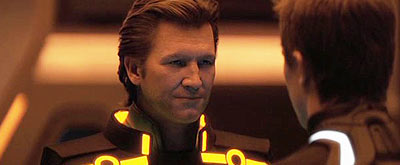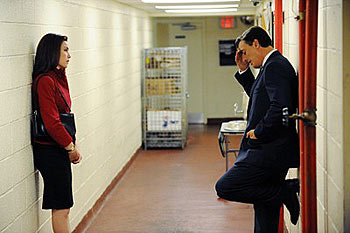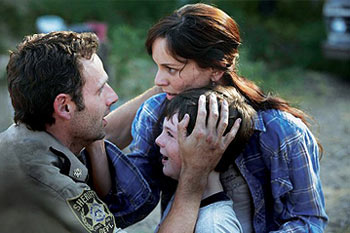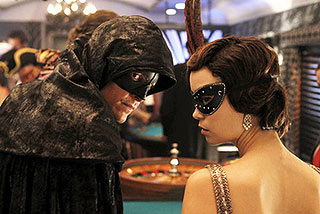A Goddess At The Console: Q&A With Mary Edwards
Published on January 30th, 2011 in: All You Need Is Now, Current Faves, Feminism, Issues, Music, Q&A |By John Lane
In another era, Mary Edwards might have been a behind-the-scenes songwriter in the famous Brill Building, that renowned stable of musical artisans that included Goffin & King, Laura Nyro, and a host of others. Instead, in this era, we are lucky to have singer/songwriter Mary Edwards in clear view. Her music is characterized by a smooth charm that draws upon soft-pop, jazz, and funk, framed with a soulful voice that is reminiscent of Dionne Warwick in her prime; her attitude reflects an almost guileless enthrallment with music and the sometimes subtle, gifted influences that can become songwriting fodder. I caught up with Mary upon the recent release of her latest album, Console.
(more…)
Destroy All Movies!!! The Complete Guide To Punks On Film
Published on January 30th, 2011 in: All You Need Is Now, Book Reviews, Books, Culture Shock, Current Faves, Issues, Movies, Music, Underground/Cult |By Less Lee Moore
Any marginalized subculture bristles at being misinterpreted on film. Then again, the punk subculture is by now so fragmented and unrecognizable, one hesitates to even attempt to define it, much less depict it on the screen.
Yet best friends Zack Carlson and Bryan Connolly spent five years documenting each and every appearance of punks on film. They were inspired to undertake this monumental task after re-watching Penelope Spheeris’s quasi documentary Suburbia and then shortly thereafter, seeing Joysticks, a video arcade comedy from 1983, for the first time.
(more…)
My Top Ten (or is it 11?) For 2011: Movies To Look For
Published on January 30th, 2011 in: All You Need Is Now, Issues, Listicles, Movies, Staff Picks, Top Ten Lists |By Lisa Anderson
The beginning of the New Year brings new movies to look forward to. Not all of them are Oscar contenders, and not all of them will be as good as they look. I’ll probably be skipping the overrated and (hopefully) played-out gimmick of 3D whenever possible. Here are the ten movies that I’m most excited about, and in most cases, I’m not alone.
(more…)
The Dad Abides: Tron: Legacy
Published on January 30th, 2011 in: All You Need Is Now, Current Faves, Issues, Movie Reviews, Movies, Science and Technology, Science Fiction |By Lisa Anderson
There have been a lot of father-son issues in movies lately.

Tony Stark deals with his father’s legacy in Iron Man 2. Robert Fischer’s feelings toward his recently departed father make possible the titular mind-crime in Inception. In The Town, Ben Affleck’s character has a troubled relationship with his jailed dad. Even the critically panned Wall Street 2: Money Never Sleeps is about the daughter of Gordon Gekko. (Okay, it was actually about her boyfriend, but still.) It’s easy to wonder if it’s just coincidence—after all, fraught relationships are an easy way to raise the emotional stakes in a story—or if there’s something going on the in popular subconscious. No recent movie has put father-son dynamics as close to the forefront, though, as Tron: Legacy.
(more…)
The Big, Bad World Of The Good Wife
Published on January 30th, 2011 in: All You Need Is Now, Current Faves, Feminism, Issues, TV |
Alicia and Peter Florrick
At first, preview spots for CBS’s The Good Wife looked less than promising: another press conference, about another cuckolded wife of a politician. Even the casting of dashing Chris Noth and long-absent-from-TV Juliana Marguiles didn’t appeal to me.
Then there was the name of the show itself: The Good Wife. It just seemed . . . stuffy.
I started catching bits and pieces of the show by accident. Despite my misgivings, it was actually intriguing, on par with the best episodes of Law & Order (Rest In Peace). Then one night I was flipping channels and there was Alan Cumming as conniving political campaign manager Eli Gold, bitching out and out-bitching some snarky-looking teenage girl. Suddenly, I was hooked.
Sometimes Undead Is Better: The Walking Dead
Published on January 30th, 2011 in: All You Need Is Now, Current Faves, Horror, Issues, TV |By Less Lee Moore
Although I’ve never read The Walking Dead comic series, I have been intrigued ever since Popshifter covered it in a past Halloween issue. When news of the AMC series popped up, I was relieved that it was receiving the episodic TV treatment; it seemed far too complex for a 90-minute movie. Interesting then, that the premiere episode was about that long, and far more engaging than much of the new breed of undead that has infected pop culture.

Rick, Lori, and Carl
As a diehard horror fan, my affections are frequently misunderstood or misinterpreted as some kind of prurient interest in the sick and depraved. Like all good additions to the horror canon, however, The Walking Dead isn’t just about zombies, the undead, or as the show itself refers to them, “Walkers.” Its social commentary is less heavy-handed than the recent spate of Romero zombie creations, but far more relevant. In fact, The Walking Dead has succeeded where four (or five) seasons of LOST failed: deftly mixing interpersonal drama with a touch of the supernatural, to raise provocative questions about our society.
(more…)
Sherlock Holmes Has A Cell Phone
Published on January 30th, 2011 in: All You Need Is Now, Current Faves, Issues, TV |By Lisa Anderson
In Central London, Scotland Yard is holding a press conference about a recent spate of suicides. The Detective Inspector insists that the deceased must all have something in common, and instantly, everyone present—police and press alike—receives a text stating simply: “Wrong!” Later that week, an army doctor, just back from Afghanistan, is checking out a potential flat with the strange, misanthropic young man he met only the day before. The landlady asks how many bedrooms they’ll be needing, saying that it’s okay if it’s only one. “Of course we’ll be needing two!” the doctor protests, shocked.
Both of these scenes take place in Sherlock, a miniseries created by the BBC but which also aired on PBS’s Masterpiece Mystery. They also both illustrate the way this contemporary retelling brings Sir Arthur Conan Doyle’s detective into the modern world, with its ever-changing technology and complicated social realities.
(more…)
The Cape: Learnin’ The Tropes
Published on January 30th, 2011 in: All You Need Is Now, Current Faves, Issues, TV |By Cait Brennan
Television has changed mightily since 2004, when a little show called Lost took to the airwaves and left behind a trail of time-traveling, Old Testament, daddy-issue, polar bear carnage. One after another, the networks have pelted home viewers with high-concept sci-fi and fantasy adventures, ranging from engaging (the unjustly canceled Invasion) to laughable (really? a reboot of V?) to just plain stultifying (The Event).

The Cape and Orwell
None of these genre efforts better typified pop culture’s creepy-uncle embrace of comic book culture than Heroes. Engaging and original in its first season, Heroes took a great cast of characters and ran them around in angel-dust spaghetti-squash circles for its last three years, finally collapsing under the weight of a mythos so impenetrable it made The X-Files look like Three’s Company. Strange and even brave, then, that NBC greenlit another big budget superhero show so soon after Heroes‘ implosion. It’s a good thing they did, because The Cape is a lot of fun—a show that both embraces and spoofs comic book tropes, with a rogue’s gallery of great characters that make it all worthwhile.
(more…)
Phineas and Ferb: Glory Days Are Here Again
Published on January 30th, 2011 in: All You Need Is Now, Cartoons, Comedy, Current Faves, Issues, TV |By Cait Brennan
Everything was better when we were kids. Ask anybody.
(more…)
Foetus, Hide
Published on January 30th, 2011 in: All You Need Is Now, Current Faves, Issues, Music, Music Reviews, Reviews |By Less Lee Moore
“Don’t ask me any questions you don’t want the answer to.”
—From “You’re Trying To Break Me”
At the risk of beginning a Foetus review with reference to another, I will do just that. If Sparks, the uncategorizable band composed (mostly) of brothers Ron and Russell Mael, can be said to make music that is practically theatrical, then Foetus, also known as JG Thirlwell, makes music that is downright cinematical.
And you know those annoying people who claim to despise movies that make them think? Those people will never appreciate JG Thirlwell. Sometimes it feels exhausting trying to figure out all his references and nods and motifs, especially when he keeps his true self so close to the chest. But for those of us who love listening to his music over and over—digging and pondering, delving deeper and deeper into it—the payoff is outstanding.
(more…)